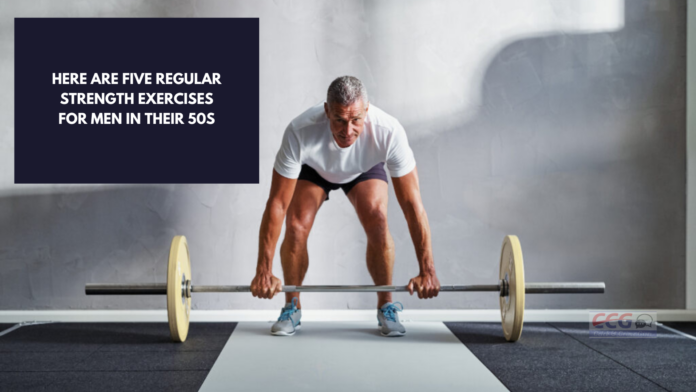Here are five regular strength exercises for men in their 50s’ The glorious 50s are the decade where wisdom meets strength and experience becomes your secret weapon. It’s also a period when taking care of your body and staying in tip-top shape becomes more crucial than ever and can determine the quality of those fast-approaching golden years. That’s why we chatted with Rose McNulty, CPT, NASM-certified personal trainer and nutrition coach with Garage Gym Reviews, who unveils five essential strength exercises for men in their 50s to add to their fitness arsenal.
Here are five regular strength exercises for men in their 50s
“Maintaining total-body strength and stamina should be a priority as you age because strength training can help preserve muscle mass, bone strength, and mobility in the long run,” explains McNulty. “These exercises are safe for most individuals and can be built upon with numerous variations. Each of the moves has core strength and stability elements, which is another crucial area of focus to keep you injury-free regardless of age.”
Strength training isn’t just about bulking up or achieving a magazine-worthy physique; it’s about investing in your long-term health and well-being. As you age, you naturally lose muscle mass and bone density (a condition called sarcopenia), which can lead to frailty, decreased mobility, and higher injury risk. However, incorporating regular strength training into your routine can reverse these effects and offer several benefits for healthy aging.
If you’re ready to take control of your health and rebuild your strength, keep reading for McNulty’s top five strength exercises for men in their 50s. After you’re finished, check out The #1 Bodyweight Workout Men Should Do Every Day To Stay Fit.
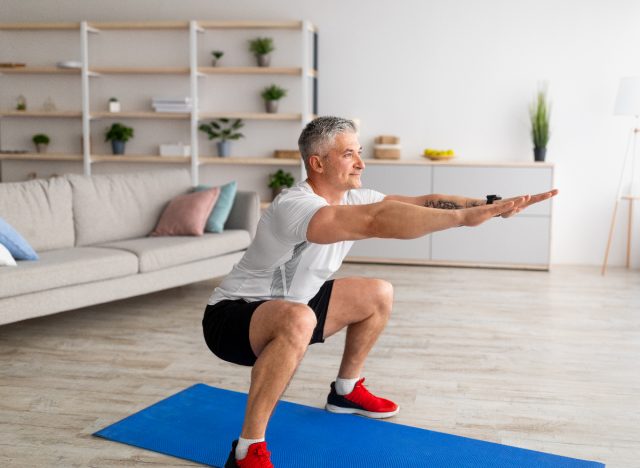
The mighty squat is a classic compound exercise that can be a game-changer for men in their 50s. Squats engage your lower body muscles, including your quads, hamstrings, and glutes, while also working your core.
To perform a squat, McNulty says, “Stand with your feet slightly wider than shoulder-width apart, and point your toes slightly outward. Maintain good posture, flat feet, and a strong core as you bend your knees and hinge at the hips to lower yourself. Push through your heels to stand back up once your thighs are about parallel with the floor or slightly below parallel.” Aim to do three sets of eight to 12 reps.
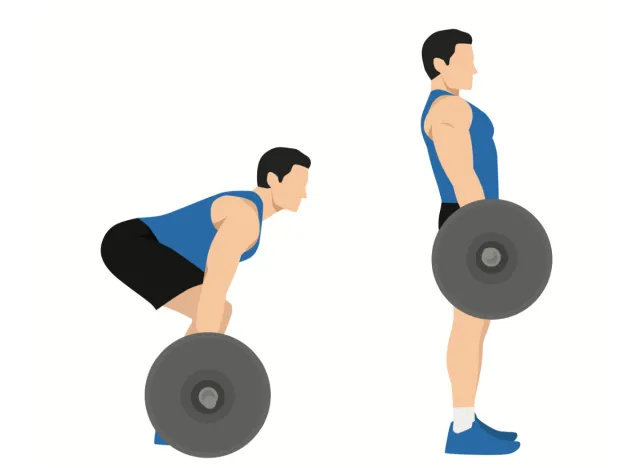
The deadlift works wonders for men in their 50s by targeting multiple muscle groups simultaneously, including your legs, back, glutes, and core. According to the Sports & Exercise Medicine Institute, this exercise promotes good posture and stability—critical components of healthy aging.
“Stand facing a barbell or dumbbell with your feet hip-width apart for a basic deadlift,” instructs McNulty. “If using a barbell, ensure it’s centred over your feet and close to your shins. Bend your hips and knees to lower, keeping your back straight as you get down low enough to grab your weights with your palms facing you. Make sure your core is tight as you push through your heels to lift the weight straight up. Keeping the barbell close to your body, stand up while maintaining your grip on the weight. Once you lift the weight and stand perfectly, slowly reverse the motion to lower the weight back down.” Perform three sets of eight to 12 reps.
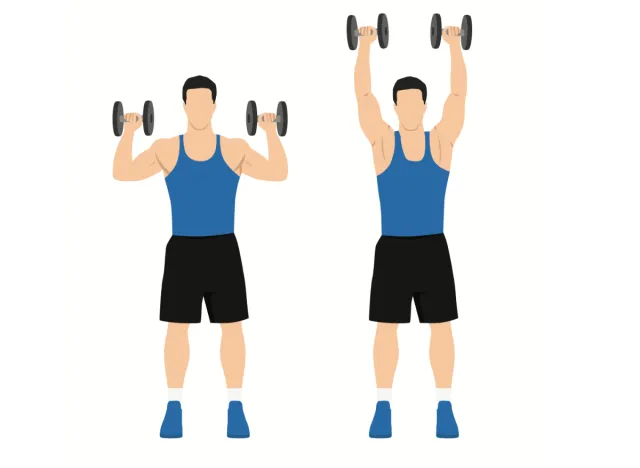
This upper-body exercise is a fantastic addition to your strength routine. “The overhead press trains your body to use proper form while lifting things above your head,” says McNulty. “Nailing the form for this exercise reduces the risk of upper-body injury when lifting or grabbing items above your head. This is another move that requires core strength and overall stability.”
Stand with your feet shoulder-width apart, holding either a barbell or dumbbell at shoulder height with your palms facing forward. Brace your core and maintain good posture as you press the weight straight up and extend your arms fully overhead. Keep your wrists straight as you press, and try not to lean back. Once your arms are straight overhead, lower the weight slowly to the starting position, and repeat. Do three sets of 10 to 12 reps.
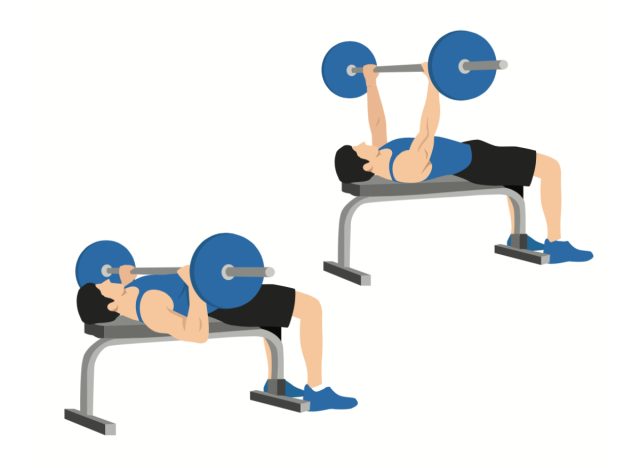
The classic barbell bench press has been a staple exercise for years. This exercise targets your chest, shoulders, and triceps, helping you build upper-body strength and definition. “The bench press is a favorite of many men, and it’s a great exercise to continue doing to maintain chest strength, overall good posture, and even core stability when done right,” McNulty notes.
To begin, lie flat on a bench facing upward with your feet planted on the floor. Grip the barbell with your hands slightly wider than shoulder-width apart and your palms facing your feet. Unrack the barbell, and hover it straight above your chest with your arms extended. Slowly bend your elbows to lower the barbell toward your chest, keeping your wrists straight and your core tight. Once the barbell lightly touches your chest, push the bar back up to the starting position, and repeat. Your elbows should stay close to your sides as you perform the movement. Aim for three sets of eight to 12 reps.
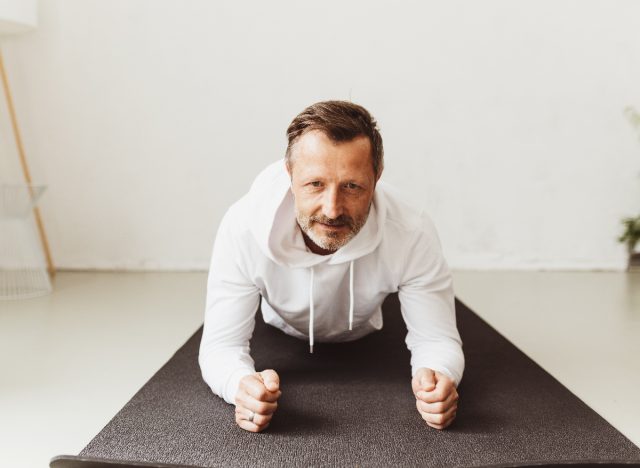
The last of these strength exercises for men in their 50s is the plank. It’s a foundational core exercise that activates and strengthens your midsection. A strong core is essential for maintaining good posture, preventing lower back pain, and boosting stability.
“Start on all fours in a tabletop position, then step your feet back so your legs and torso form a straight line,” says McNulty. “Lower onto your forearms, keeping your hips low and ensuring your body forms a straight line from shoulders to ankles. Actively brace your core to hold this position for at least 30 seconds. If your form falters, try lowering your knees to the floor while maintaining a strong core.” Do three sets of 30 to 60-second planks.
